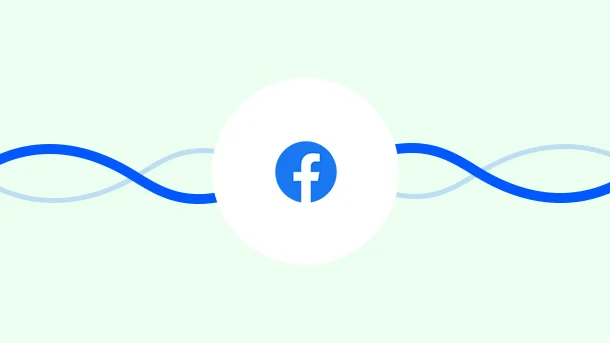
When done right, no doubt Facebook Ads help you reach thousands of potential customers.
But creating an effective ad is tricky – it is not as simple as throwing together some text and images and hitting the ‘publish’ button.
Although Facebook’s self-serve advertising system is accessible and easy to use, many fail to understand how to effectively use each section of the ad.
This post walks you through the anatomy of a Facebook ad and provides tips for each component so that you can easily design your own high-performing ads.
We’ll also look at the different types of Facebook ads and how businesses use them to achieve their goals.
Let’s get started!
A perfect Facebook ad anatomy comprises of :
It is the one that appears above your ad visual and can be either short or extended to paragraphs. Facebook recommends using text up to 125 characters. Anything beyond it gets truncated. The primary text depends on your ad and your audience. But, we recommend keeping it:
Short,
Crisp,and
Compelling the viewer to click
Pro-tips for your perfect primary text:
Use simple language for your target audience to understand your content.
Make use of emojis to draw attention.
Choose a writing style that is easier to read and consume.
For Example: In the below ad, Meta for Business uses a short text to describe their intention of selling their Facebook marketing course.
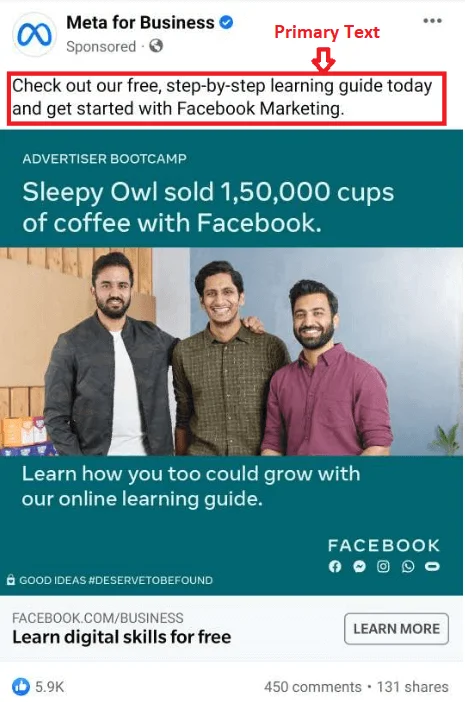
A picture is worth a thousand words, and perfect visual content is worth a million dollars! Visuals (images/videos/both) increase Facebook engagement. Most viewers prefer visuals to text, so you must always use a high-quality one to grab their attention.
Pro-Tips for attention-grabbing visuals :
Use no more than 20% text in your image.
Use high-quality images and videos.
Ensure that the text you use in the visual is an attractive one.
For example: In the below ad, Invideo uses a high-quality image with attractive text to grab the attention of content creators.
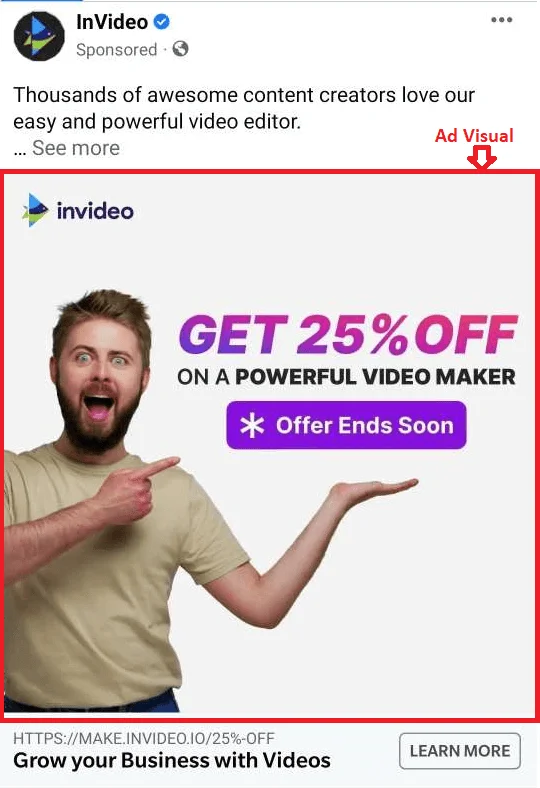
8 Million+ Ready Automations
For 750+ Apps
The headline or title is your ad’s first impression and needs to be catchy enough to make people want to learn more. It must also accurately reflect what you’re selling. Facebook recommends using 40 characters (it truncates the remaining characters).
Prop-tips for that captivating headline:
Make use of keywords related to your ad that are well-performing.
They are the lead magnets for cold audiences unaware of your brand, so use headlines that solve their pain points or offer something lucrative.
Make use of emojis wherever possible. It amplifies your message and grabs attention.
For example, Asana (a team collaboration app) used a catchy 5 words headline to grab the attention of its target audience.
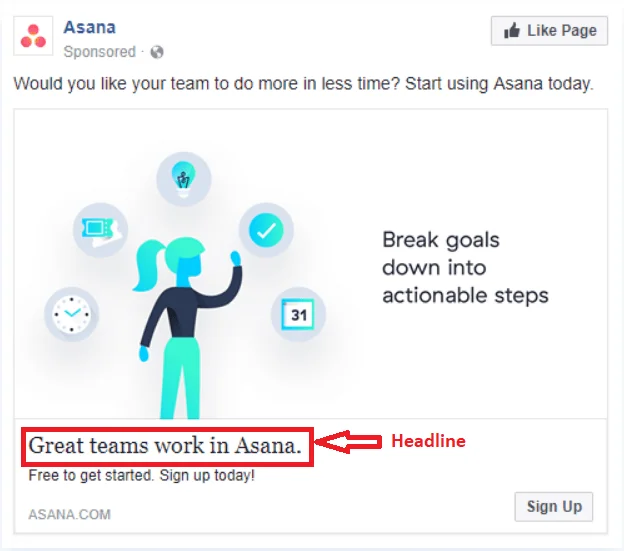
It targets your audience to the given URL when they click on your ad.
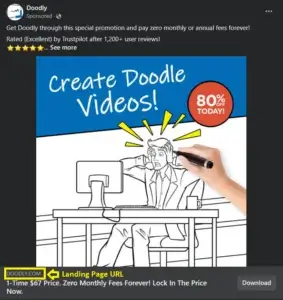
Text placed below the headline that describes it in detail. It must be exciting enough for your target audience to engage and take action. You can add up to 5 descriptions while creating your ad copy.
Pro tips :
Add details about what is in it for your target audience, and
How will they benefit
For Example, to introduce its first smart glasses, Ray-Ban used a crisp description – ‘Facebook meets Ray-ban frame’ that along with the headline made a quick connect with its target audience.
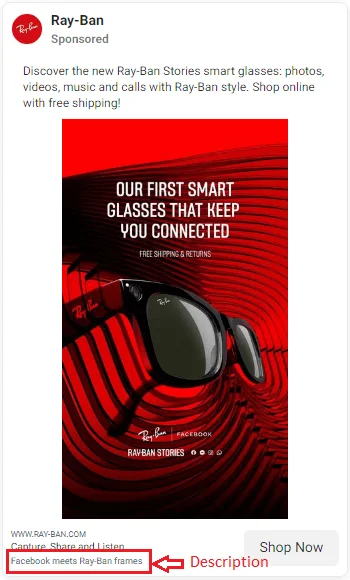
Use this button to send your leads to a specific landing page and take further action.
Some common CTAs include:
Download our app
Visit our website
Sign up
Call us now
Shop Now, etc
For example, Be.Bodywise (health supplements manufacturer) uses ‘Shop now’ CTA to direct buyers to their website for further purchase.
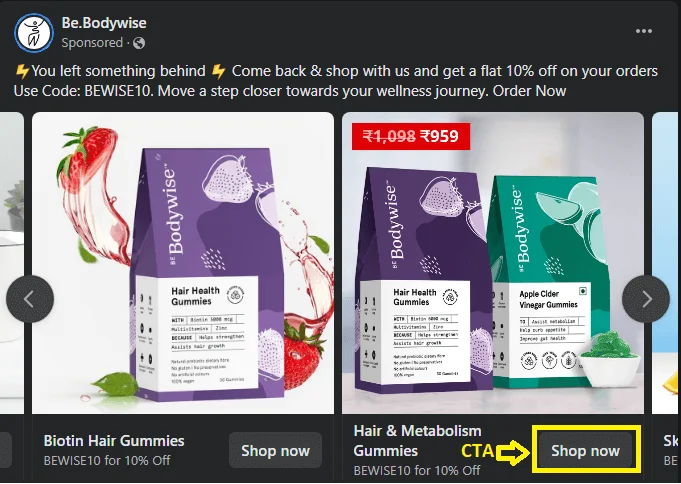 Now that we have discussed the anatomy of a perfect Facebook ad, let us go through the types of Facebook ads.
Now that we have discussed the anatomy of a perfect Facebook ad, let us go through the types of Facebook ads.
There are several Facebook ad types to choose from:
Single Image ads: The oldest form of ads that work best for driving traffic to your website or app.
Best practices for your image ads :
Have a single focal point
Highlight the use of your product/service
If you run multiple ad sets in a campaign, maintain visual consistency
Use high-resolution images
For example, this Pizza hut ad uses a great visual with a catchy text and offer that surely tempts you to buy 1.
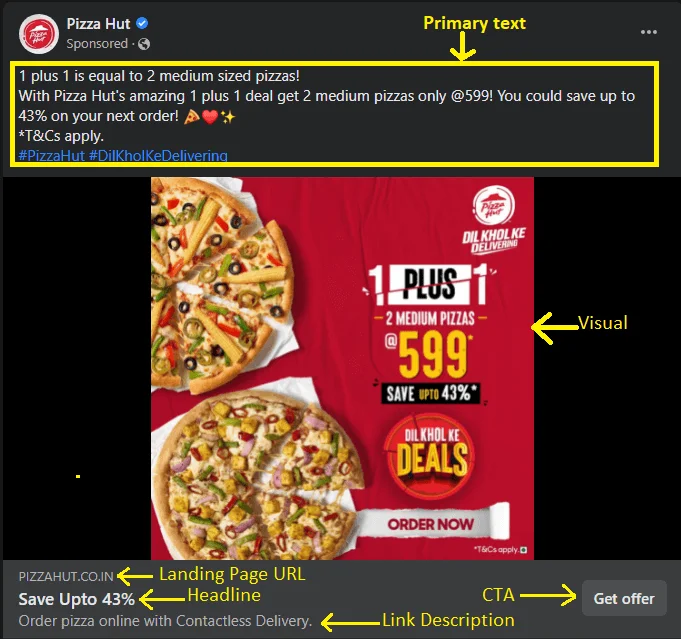
Video Ads: Draw attention to your product by using sound and motion with the video ads. Use your video ads in various placements like :
In-stream: Video ad inside the videos that people watch
Newsfeed: Ads that will show up on people’s home page feeds and grab attention
Stories: Gives you maximum engagement and watch-time
Messenger: Video ad that on click starts one-on-one conversations with your customers in Facebook messenger.
Playables: Give people a test drive of your mobile gaming app with an interactive preview.
For example, Boat’s marvel themed Facebook video ad is a stunning one. It presents an offer in such a compelling way that no user can resist clicking.

Carousel Ads: Use carousel ads to :
Show different images of the same product, or
Create one long photo that people can swipe.
You can display up to 10 photos or videos in a single ad, each with its link.
Best suited to:
Display multiple products,
Highlight features of a single product,
Engage people, or
Highlight a process
For Example, Tieks (a ballet-flat manufacturer) uses carousel ads to prominently highlight their only product—women’s flats. Each tile card shows and describes a different feature. Also, zooming in a part of the shoe urges the viewer to swipe and engage with the ad.
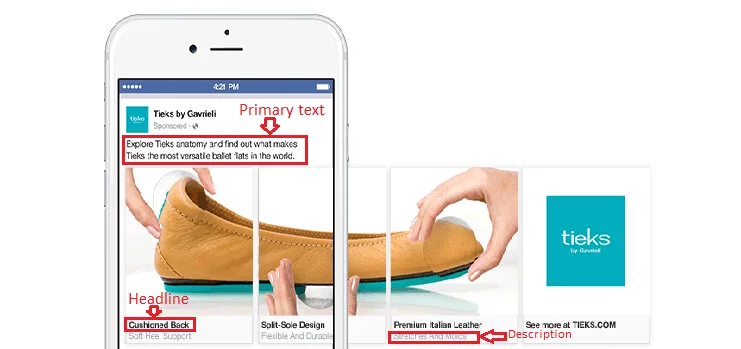
Collection Ads: Collection is a new ad format where customers interact with your brand in an immersive, visually appealing experience on Facebook/Insta. Each Collection ad features a primary image or video with three smaller images below in a grid-like layout. Customers who tap on your Collection ad to browse or learn more or shop are seamlessly taken to an immersive experience on your website – all without leaving Facebook or Instagram.
For example, KFC uses collection ads to display their menu items, and on click, they direct the customers to place an order without leaving the app.
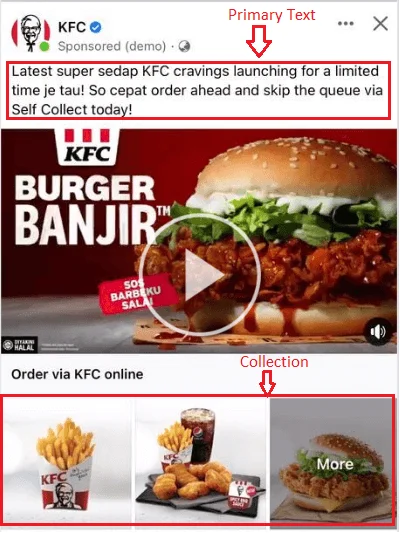
Facebook Instant Experiences (previously known as Canvas Ads) : These are mobile-optimized ads to help capture the complete attention of the users. Your audience can watch engaging videos and photos, swipe through carousels, tilt to pan and explore lifestyle images with tagged products—all in one ad.
For example, TYME (a styling tool manufacturer) uses the Facebook Instant experiences to give an immersive experience to its viewers where they can scroll through
A video tutorial,
Read reviews,
Shop products, and
Visit their Youtube channel
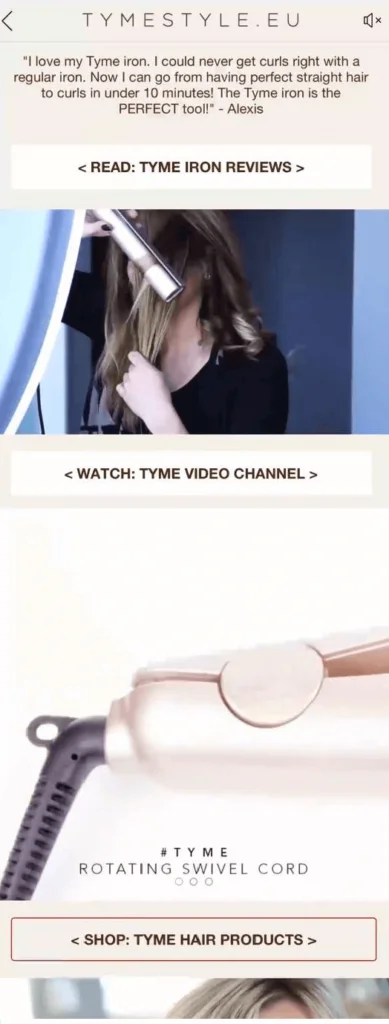
As you see, there are multiple ad types to choose from and many factors to consider.
But if you nail the anatomy of a perfect Facebook ad – that is
An eye-catching and high-quality visual,
A short and catchy headline,
A relevant landing page URL,
Helpful link description, and
A strong CTA,
you can create better ads that achieve your desired results
What are you waiting for? Start creating those awesome ads today!
Happy advertising.